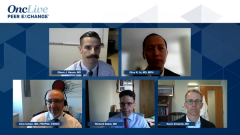
Treatment Options for Basal Cell Carcinoma
Drs Emerick and Bakst continue to speak on the data from the first clinical case scenario and highlight other treatment options.
Episodes in this series

Glenn J. Hanna, MD: Taking this example into account, is there a scenario or are there a couple of pearls you would comment on about patients who are not optimal for surgery? Are there any red flags you would say or any case features that would turn you away from a surgical approach in basal cell carcinoma?
Kevin Emerick, MD: We can think about cases that aren’t good for surgery from a tumor perspective and then from a patient perspective. From a tumor perspective, there are some basic principles we’ve always talked about in head and neck surgery. These extensive tumors on the scalp that end up going through bone and into the sagittal sinus, for example, are just not resectable, literally not resectable. Occasionally, some of these infiltrative tumors on the neck that are going to invade into great vessels, carotid in particular, or the posterior neck, we see invading down into that deep neck fascia, those are kind of our historical cases that can’t and shouldn’t be removed with surgery. But we can also apply a commonsense approach too, like someone who has a functioning eye…is someone who I don’t think of as being surgically resectable. Someone with a functioning facial nerve, where surgery is going to require transection of the facial nerve, is perhaps not a good surgical candidate in that way. Someone who has a functioning mouth, where a large resection of the lip, again, is not going to be functionally resectable. And then we can think about patient-related issues. By nature, many of these patients are not 72 years old, they are 88, they are 92. I saw a 103-year-old this week with a resectable tumor, and he’s highly functional. I don’t know if I should resect that tumor. That’s my starting point for thinking about some of these patients who are truly not surgically resectable.
Glenn J. Hanna, MD: Right. I’ll give Dr Bakst a chance before we move on to the next piece of the case to comment on, Rich, when would you think about radiation being appropriate, or maybe flipped the other way, when is it not appropriate? And when do you feel like a more systemic approach for basal cell is appropriate even in a locally advanced setting?
Richard Bakst, MD: Yes, just to echo Dr Emerick’s comments, there’s certainly a threshold where surgery is not appropriate. The question becomes, when is radiation appropriate or not appropriate in those cases? In someone who’s had radiation, even if it’s just superficial orthovoltage, and it recurs, that may speak to a radio-resistant biology, and if it’s growing after that, that’s one level of concern. Young patients where you’re worried about long-term effects of radiation, that’s another area where there may be some concern. Disease that involves critical structures near the eye, where we’re worried about exceeding tolerance, that’s concerning. We do have tools like proton beam and other ways to deliver the radiation to try to spare those long-term toxicities. And then in patients who are just contraindicated to radiation, scleroderma, and other cases like that, we may consider starting with upfront systemic there.
This transcript has been edited for clarity.




































